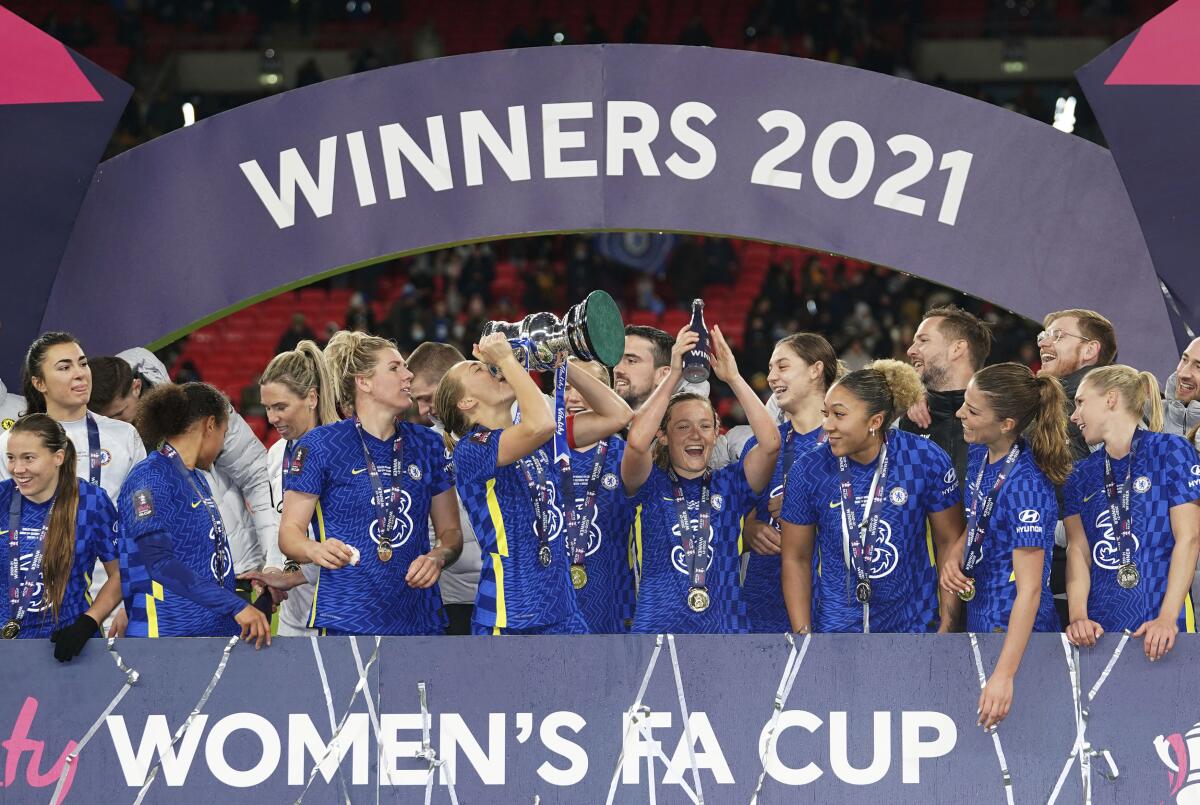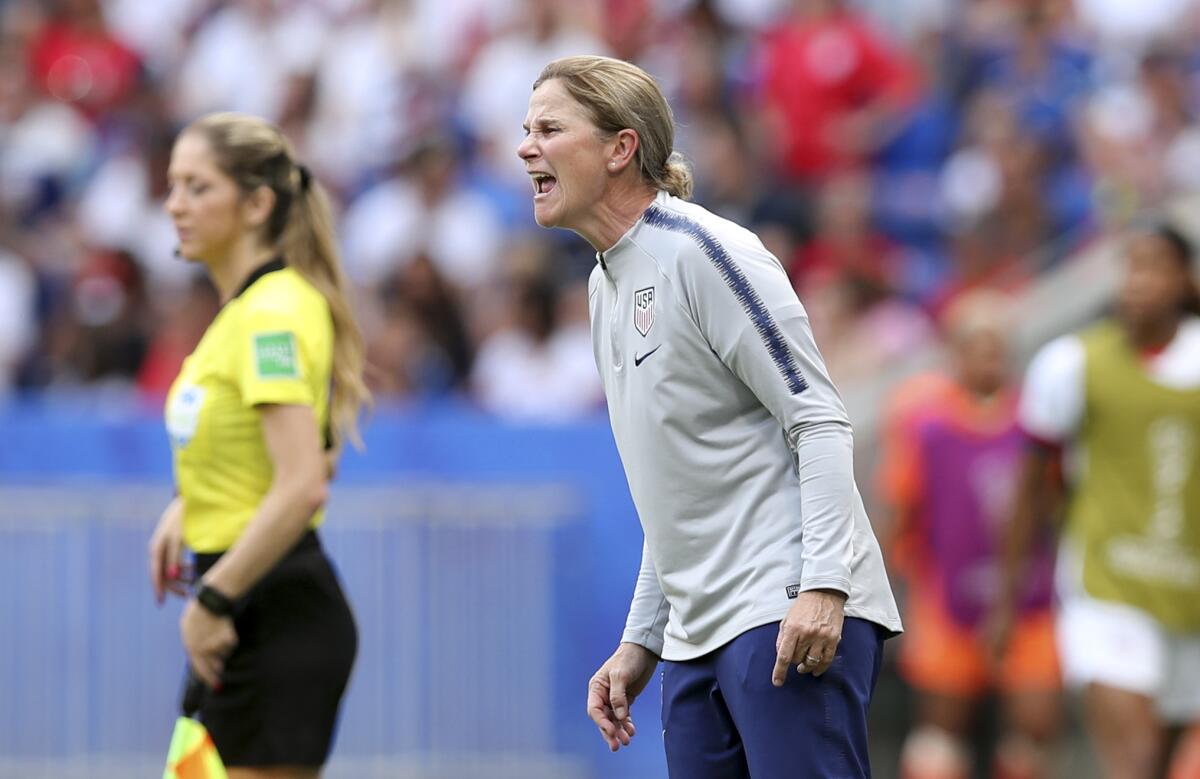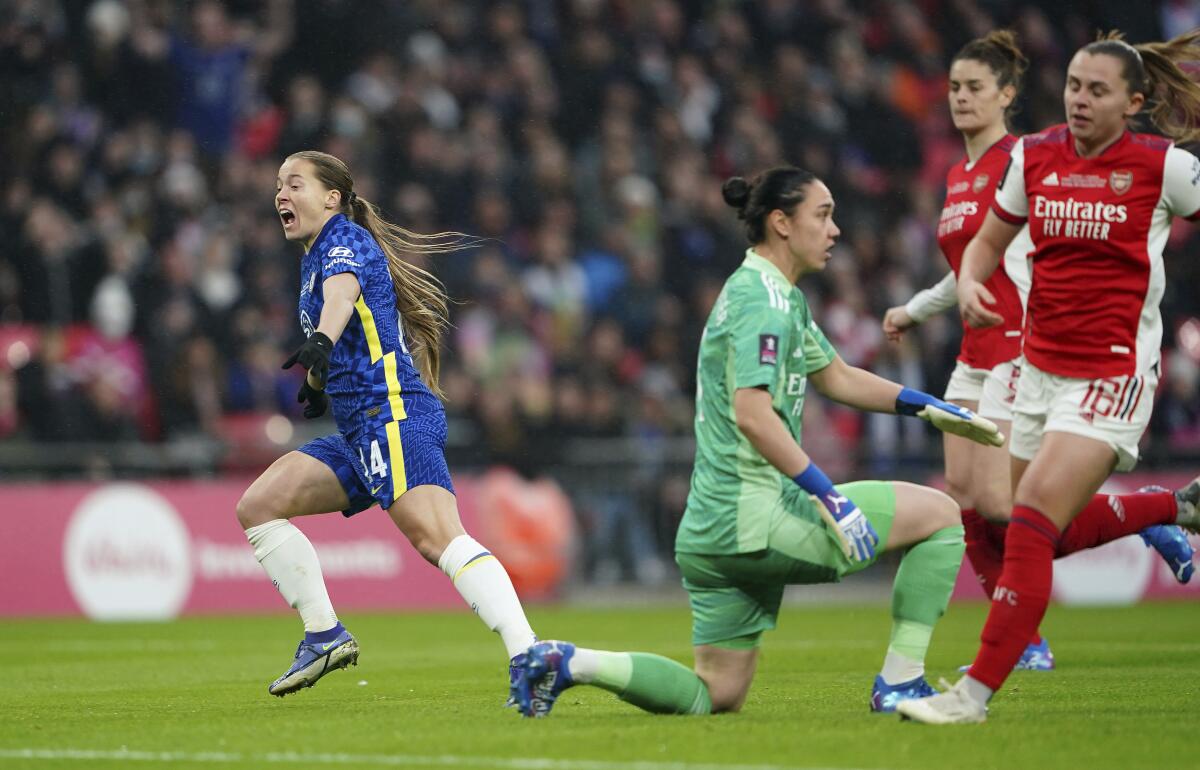Soccer newsletter: Sam Kerr and Chelsea help smash FA gender bias on historic day

- Share via
Hello and welcome to the L.A. Times soccer newsletter. I’m Kevin Baxter, the Times’ soccer writer, and we begin today with Sunday’s women’s FA Cup final, in which Chelsea beat Arsenal 3-0 in front of a crowd of 40,942 at Wembley Stadium.
Australian Sam Kerr, who is on the short list of the best women players in the world, led the way with a pair of second-half goals to help Chelsea win its first domestic treble (FA Cup, League Cup and Women’s Super League).
But there’s a much bigger reason why Sunday’s game was important.
The final, originally set to be played last spring, was delayed by the COVID-19 pandemic. And in an attempt to right a century-old wrong, the English Football Association — the FA — rescheduled the game in London’s iconic stadium for Dec. 5, a date which has long lived in infamy in European soccer.
On that day 100 years ago, the FA banned women’s football from being played in its stadiums. Because virtually every team in England was governed by the FA, the ban essentially forced women to play in smaller venues outside the media spotlight. The women’s clubs, not long able to support themselves through ticket sales, quickly disbanded.
The FA justified the stadium ban with sexist and misogynistic tropes that claimed kicking was too jerky a movement for women and women were too frail and delicate for the rigors of the sport.
The real reason was far more sinister.
In her 2017 documentary “When Football Banned Women,” Clare Balding suggests the FA — which was run by men for men — was motivated more by fear of the women’s game becoming too popular and challenging the dominance of the men’s game. In 1920, a Boxing Day game at Everton’s Goodison Park drew a crowd of 53,000, a record for a women’s club match. Another 14,000 fans were turned away.
The FA responded to the threat almost immediately, releasing a draconian list of restrictions that ostensibly were meant to protect the women but, in reality, were designed to stop them from playing. When the women refused to take the hint, the FA locked its stadiums and quickly got what it was looking for.
The rest of Europe soon followed with Germany, the Netherlands, Italy and France all stopping women from playing football. The language differed slightly by country, but the justification generally was the same: the game was too tough for girls and would make them masculine.
Many of those bans, which weren’t lifted until the 1970s, went well beyond the professional game. Jill Ellis, who coached the U.S. to two Women’s World Cup titles, grew up in England at a time when even organized youth soccer was unavailable for girls. After her parents moved the family to the U.S., Ellis captained her Virginia high school team to a state title and won a U-19 national championship with her club team.

Chelsea coach Emma Hayes said her thoughts Sunday were with players like Ellis and others whose dreams were dashed by the FA. That made the match far more meaningful than the final score.
“I said to the girls before the game, ‘Today we play for everyone who’s made the women’s game what it is,’ ” she told reporters. “Women’s football is our livelihood, but it’s also our passion and today that win was for every woman who’s been involved in women’s football in this country.”
Only now is the women’s game in Europe beginning to regain the popularity and respect it had in the days just after World War I. Consider that the five countries which banned women’s soccer in the first half of the 20th Century — England, France, the Netherlands, Italy and Germany — all made the quarterfinals of the last Women’s World Cup.
There are thriving pro leagues in France, Spain and England. In Italy, the Serie A will become fully professional next season, a designation Spain’s women’s league received earlier this year.
Irene Lozano, president of Spain’s Sports council, said the government recognition will allow the league to become independent and make it eligible for better resources while “put[ting] an end to this injustice.”

At its top level the women’s game is attractive, entertaining, competitive and well played and the public is again embracing it. FIFA says 1.12 billion viewers watched broadcast coverage of the last women’s World Cup in 2019. More than 260 million viewers tuned in for the final between the U.S. and the Netherlands, the highest-ever live audience for a women’s match.
In September, England’s Women’s Super League signed a three-year television deal worth more than $30 million, largest ever for a women’s soccer league. Sky Sports and the BBC immediately were rewarded when the league drew a record cumulative audience of more than 1.5 million for the three matches broadcast live on the weekend of Nov. 13-14.
Other major companies are lining up to get involved. Barclay’s bank, which paid $5.2 million a year to become the WSL’s title sponsor in 2019, is also funding a program to entice girls to get involved in the sport at the grassroots level. Toolmaker Stanley is a major sponsor of Barcelona’s women’s team while the NWSL, the top U.S. league, has deals with MasterCard, Budweiser, Nationwide, Verizon and Secret Deodorant.
Given how quickly the things have advanced in the last few years begs the question of where the women’s game would be if it hadn’t been strangled in its cradle by the FA a century ago. It’s unlikely it would be equal to the men’s game in terms of popularity but, given the fact the men had a five-decade-long monopoly on the sport, it’s not inconceivable the women would be a worthy rival.

In sports from gymnastics, tennis and figure skating to surfing, track and field and swimming, women often draw a larger TV audience than their male counterparts. Who can say definitively that wouldn’t have happened in soccer? After all, the largest domestic TV audience for a soccer game in the U.S. was for a women’s game, the 2015 World Cup final.
English international Fran Kirby, who scored Chelsea’s first goal in the FA Cup final, acknowledged the significance of the game and the progress of her sport.
“It’s a massive day for women’s football,” she told reporters. “Today was about not forgetting the trail blazers who helped us get here. Hopefully the performance today made everyone proud and hopefully more people want to get involved in women’s football.”
Enjoying this newsletter? Consider subscribing to the Los Angeles Times
Your support helps us deliver the news that matters most. Become a subscriber.
Behavior of Mexican fans ‘absolutely unacceptable’
It’s getting harder and harder to explain, much less excuse, the behavior of some Mexican soccer fans. The latest example came in Saturday’s Liga MX playoff semifinal in León, where fans showered Tigres forward André-Pierre Gignac with debris and the now-infamous anti-gay chant as he left the pitch. Ten minutes late Angel Mena scored the deciding goal in a 2-1 win that sent defending-champion León into a two-leg playoff final with Atlas beginning Thursday in Guanajuato. The return leg will be played Sunday in Guadalajara.
How can this be considered acceptable anywhere?
ESPN commentators David Faitelson and León Lecanda were quick to condemn it.
“Going to a soccer tribune to throw objects at a footballer has no justification,” Faitelson said.
“If Liga MX/FMF really want to change the image of Mexican soccer, they must start with ZERO TOLERANCE,” Lecanda wrote on Twitter, referencing the country’s national soccer federation, the FMF, as well as the domestic league.
“This is absolutely unacceptable,” he added.
Less than a year ago much of Mexico was cheering Gignac, a Liga MX all-star who was then leading Tigres to victory over LAFC in the CONCACAF Champions League and to a spot in the FIFA Club World Cup final against Bayern Munich. But last Saturday’s verbal abuse against the Frenchman, who has spent the last seven years in Liga MX, began before the match did — attacks Gignac appeared to acknowledge with an obscene hand gesture.
That hardly justifies what came later and it reflects poorly on Liga MX just as it embarks on a new series of cooperative endeavors with MLS intended to professionalize the Mexican league.
Yet the Liga MX and FMF, the main governing bodies of Mexican soccer, seem powerless to control the behavior in the stands, and that is raising concerns with the World Cup scheduled to come to the country in 2026.
The FMF’s inability to stop the offensive, anti-gay chant has resulted in multiple sanctions from FIFA, including a ban on fans for Mexico’s first two home World Cup qualifiers in 2021 against Costa Rica and Panama.
Mexico played its first qualifier last September in an empty stadium, the result of an earlier FIFA penalty, while its second qualifier a month later was stopped in the second half when fans began using the chant again.

“The solution is within us. We have reduced the chant drastically,” FMF president Yon de Luisa told me.
To stamp it out completely De Luisa said the federation is considering a program he said is used by concert venues and other sports organizations such as Formula One that requires fans to provide their personal information before being admitted into the stadium.
“The stadium and the Federation will know, person by person, who is in the stadium,” De Luisa said. “And if anybody goes ahead and carries on with the chant, then we will be able to suspend that person for many years. It is not something that you can sue them or take them to court or anything else. With this new process and having all the database and the information, if you are asked to leave the stadium then you will spend several years without watching football in the national team stadium.”
Playing important games in an empty stadium, De Luisa continued, is a “disadvantage that we cannot live with.”
Tata Martino, coach of the national team, agreed while also appearing frustrated with the fans’ inability to understand they are hurting, not helping, El Tri.
“The rules are to be fulfilled. We obviously have not followed them, beyond all the effort of the federation to change this situation. So we have to assume the punishment,” he said in Spanish. “We need people to come and encourage us.
“We are not interested in people who annoy the rival. What the rival deserves is respect.”
MLS Cup returns to familiar territory
The last season the Western Conference representative in the MLS Cup final came from outside the Pacific Northwest, Chivas USA was part of the league, Jurgen Klinsmann was coaching the U.S. men’s national team and Bruce Arena was leading the Galaxy to its fifth league championship.
That was 2014. In the seven seasons since Seattle and Portland have shared the conference’s invitation to the title game, with the Timbers earning the right to host the final for the first time after last weekend’s 2-0 win over Real Salt Lake. On Saturday they will face New York City FC, which earned its first trip to the MLS Cup final with a 2-1 win over the COVID-depleted Philadelphia Union.

The appearance in the conference final marked the best postseason performance for Philadelphia, which joined MLS in 2010.
Portland, which beat Columbus in its first trip to the championship game in 2015 and then lost to Atlanta in the final four years ago, takes a six-game win streak into the final. It won its final three regular-season games to reach the postseason as a fourth-place team before rolling over Minnesota United, Colorado and RSL to reach the final. Goalkeeper Steve Clark has conceded just two goals since Oct. 23 and has posted four shutouts.
New York City is almost as hot. It has lost just once since September and went 3-1-3 over its last seven games to finish fourth in the Eastern Conference. In the playoffs, it shut out Atlanta, eliminated New England in a tie-breaking penalty-kick shootout and beat the shorthanded Union on Talles Magno’s goal with two minutes left in regulation.
Philadelphia was missing 11 players, including six starters, to the MLS COVID protocols while New York was without Taty Castellanos, the league’s leading scorer who drew two yellow cards and expulsion during the semifinal win over New England. Castellanos is expected to be back on the field for Saturday’s final.
MLS playoffs
Western Conference
Final
Portland 2, Real Salt Lake 0
Eastern Conference
First round
Semifinals
Nashville 1, Philadelphia 1 (Nashville advances on penalties, 2-0)
New England 2, New York City 2 (NYCFC advances on penalty kicks, 5-3)
Final
New York City FC 2, Philadelphia 1
MLS winter schedule
Now-Dec. 12: Deadline for playoff clubs to submit bona fide contract offers to players on their roster
Now-Dec. 12: Deadline for playoff clubs to exercise or decline existing contract options
Dec. 12: Half-day trade
Dec 14: Expansion draft
Dec. 15: End-of-year waivers period and free agency opens
Dec 17: Re-entry process, stage 1 begins
Dec 23: Re-entry process, stage 2 begins
Jan. 1: European transfer windows begin opening
Jan 11: 2022 SuperDraft
Feb 26: 2022 MLS season opens
And finally there’s this …
Cal State L.A. is heading back to the NCAA Division II Final Four after David Elizaga’s goal in the 67th minute gave it a 1-0 win over Cal Poly Pomona. The Golden Eagles (17-2-2) will face Nova Southeastern (17-3-2) in Thursday’s national semifinal. Cal Poly Pomona finished 14-5-4 … Southern California’s top two women’s college soccer programs lost coaches last week, with USC’s Keidane McAlpine, the Pac-12 coach of the year, taking over at the University of Georgia and UCLA’s Amanda Cromwell leaving Westwood for what is expected to be a return to Orlando as coach of the NWSL’s Orlando Pride. Both coaches won national titles in the Southland, Cromwell in 2013 and McAlpine in 2016 … Jesse Marsch is out as manager at Bundesliga club RB Leipzig after five months. The former Chivas USA midfielder and Supporters’ Shield winner as manager of the New York Red Bulls won two league titles and two cup titles in Austria at Red Bull Salzburg. Leipzig was 5-6-3 under Marsch, who missed the team’s last game while in COVID quarantine.
Podcast
Don’t miss my weekly podcast on the Corner of the Galaxy site as co-host Josh Guesman and I discuss the Galaxy each Monday. You can listen to the most recent podcast here.
Quotebook
“This is part of development, not only for the Mexican Federation but for the entire industry. And we cannot be left out of this development. If we see the brands of national teams like Brazil, like France, Belgium, Italy, Spain, Costa Rica, Ecuador -- there’s many national teams that have renewed their logos or their brands. Mexico’s national team logo has been extremely powerful through time. It is a brand that is well recognized, not only here, but in the United States and internationally. We are trying to keep the essence of the brand with this renewal, but looking forward towards 2026 and whatever is coming in the future.”
Yon de Luisa, president of the Mexican soccer federation, speaking about the federation’s new logo, unveiled last week. The rebrand is the result of a two-year strategic initiative to evolve, modernize and adapt the team’s image while demonstrating a deep appreciation for its history and the elements that made up the current crest, such as the colors of the flag, the eagle, the Piedra del Sol (sun stone) and the ball“
Until next time...
Stay tuned for future newsletters. Subscribe here, and I’ll come right to your inbox. Something else you’d like to see? Email me. Or follow me on Twitter: @kbaxter11.
Go beyond the scoreboard
Get the latest on L.A.'s teams in the daily Sports Report newsletter.
You may occasionally receive promotional content from the Los Angeles Times.




